Ben Carson campaign reaping cash as he rises in GOP polls
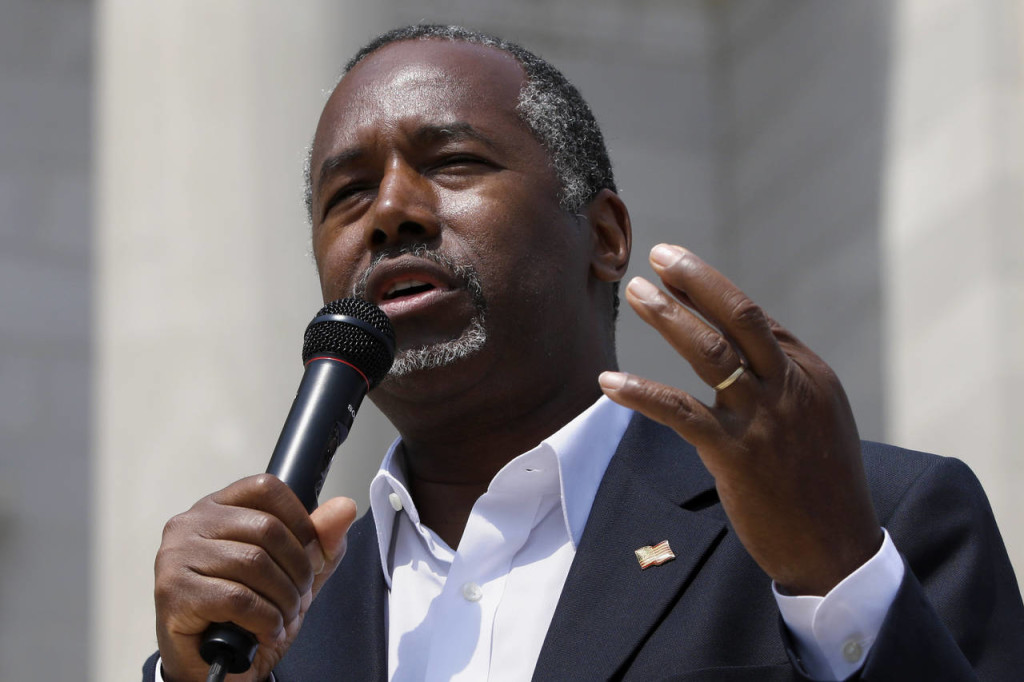
Vacation-filled August is typically one of the worst months for any politician to raise money. But it was Ben Carson‘s best yet. The political novice, a retired neurosurgeon seeking the 2016 Republican presidential nomination, raised $6 million, doubling his July total, his campaign told The Associated Press on Tuesday. Carson’s supporters have handed over roughly $20 million since he began raising money in March, making him a fundraising standout in a sprawling field of 17 Republican contenders. He enters the fall well-funded and rising in the polls, having carved out a niche as the mild-mannered version of bombastic Republican front-runner Donald Trump. Both appeal to voters – and small donors – who reject politics as usual. The doctor’s campaign is unusually reliant on small donors when others have turned to super PACs for million-dollar checks. Trump, a multibillionaire, is largely paying his own way. Of Republican and Democratic presidential candidates, only Vermont Sen. Bernie Sanders has a higher percentage of small contributions, defined as $200 or less per election cycle, than Carson. The dollars have arrived through innovative marketing campaigns and brisk sales of swag. “Carson for president” ball caps have netted $700,000 and individually numbered lithographs of the doctor an additional $500,000. A 90-page abridged version of Carson’s best-selling book “Gifted Hands” has sold 47,000 copies at $20 apiece. Even Carson’s campaign bus – dubbed the “Healer Hauler” by his fans and given its own Twitter handle (@healerhauler) – became a fundraising opportunity. The vehicle will soon be adorned with the names of some 4,000 children whose parents each paid $50 for the privilege. Carson turns his attention to traditional political fundraising this month, as he attends 25 events across the country where price of entry starts at $1,000. And a trio of pro-Carson super PACs and a nonprofit policy group in recent days got a boost when it became legal for his former campaign manager, Terry Giles, to coordinate their efforts. By law, Giles had to “cool off” for 120 days before joining the outside groups, which unlike the campaign, can accept donations of unlimited size. Carson posted strong initial fundraising numbers when his campaign filed its first two reports this year. Through the end of June, no Republican campaign had raised more except former Florida Gov. Jeb Bush and Texas Sen. Ted Cruz. (Govs. Scott Walker, John Kasich and Chris Christie hadn’t been in the race long enough to file reports at the time.) Carson’s money is paying for about 50 campaign employees and an intense travel schedule for the candidate. Campaigns aren’t due to file their next fundraising reports, covering July through September, to federal regulators until mid-October. Most have been reluctant to share summer fundraising totals. Republished with permission of the Associated Press.
Marco Rubio says nation doesn’t need U.S. Education Department
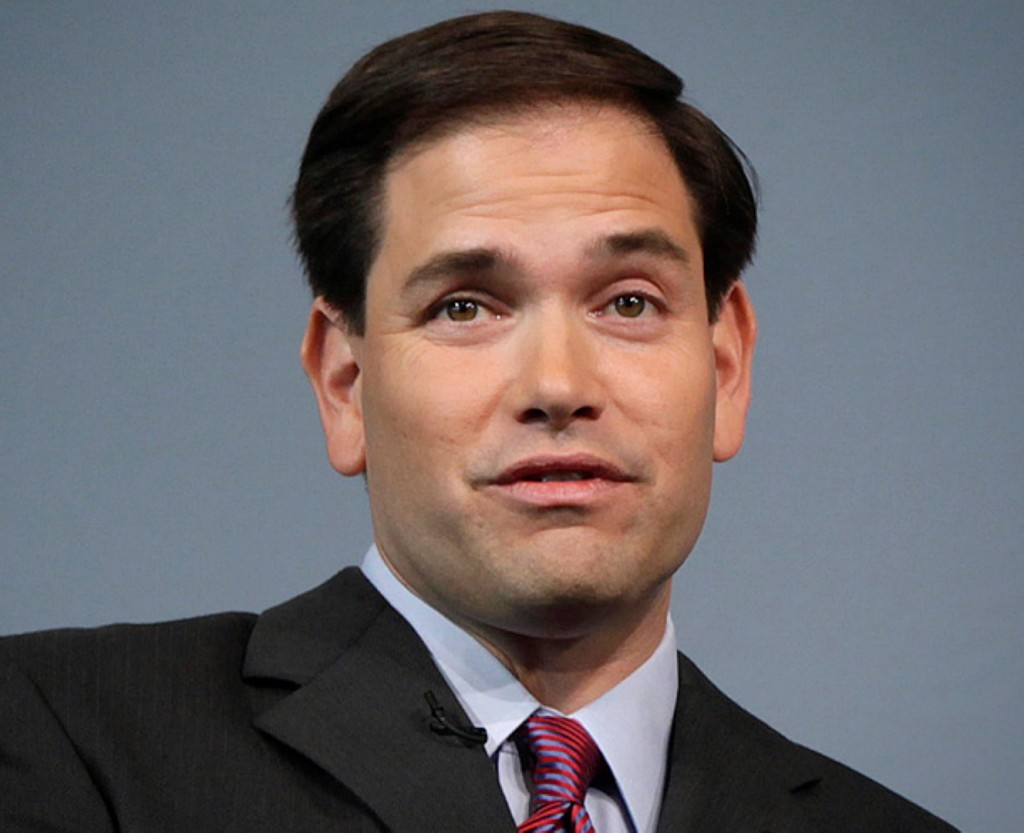
Republican presidential hopeful Marco Rubio says the U.S. doesn’t need a federal Education Department. The Florida senator spoke at a town hall meeting of about 200 people on Tuesday in Carson City. He’s on a multi-stop tour of northern Nevada. Rubio says the department starts out by making suggestions, then turns them into mandates and forces schools to implement them in order to receive federal money. He says some of the department’s duties could be divided among other agencies. Rubio drew applause and cheers when he told his audience he doesn’t support the Common Core education standards. Republished with permission of the Associated Press.
Alabama lawmakers set to return for second special session
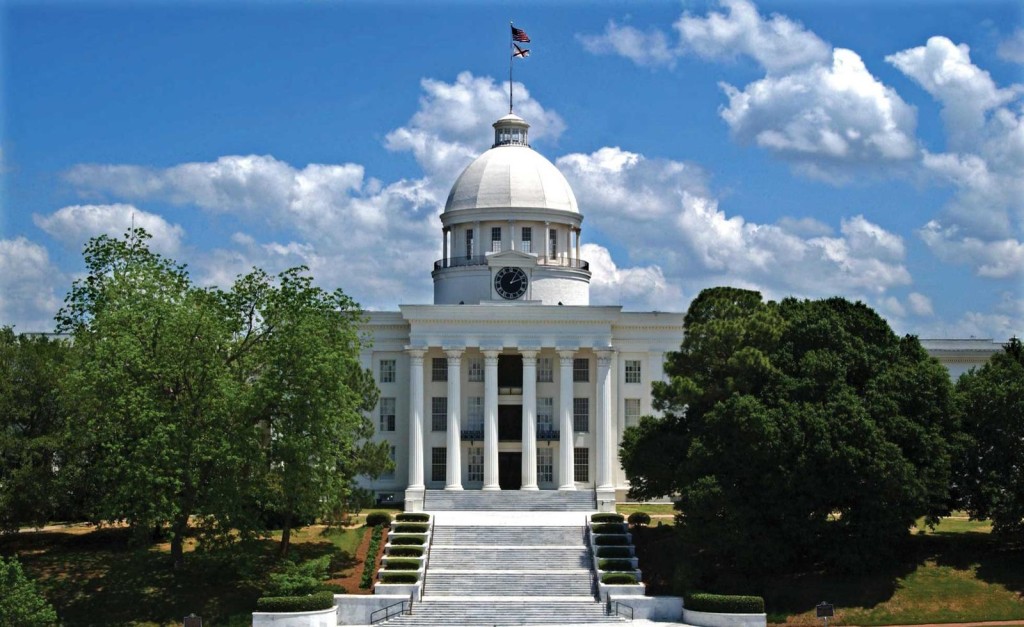
Gov. Robert Bentley has called a second special session for next week to try once again to pass a state budget. Bentley announced Tuesday that he is bringing lawmakers back to Montgomery on Sept. 8. The second special session is necessary after the regular session and a first special session ended in stalemates over proposed solutions to a projected general fund budget shortfall. Bentley has proposed raising $300 million in new taxes to resolve the budget issue rather than make cuts to state agencies before Alabama’s fiscal year begins Oct. 1. However, many lawmakers have voiced opposition to the idea. “The start of Fiscal Year 2016 is quickly approaching, and there is still no General Fund Budget in place for state agencies to operate,” Bentley said in a statement. “There is still time remaining to pass a budget that does not drastically cut state services which will impact Alabamians.” Heads of several state agencies have been touring Alabama in recent weeks explaining what potential funding cuts could mean for their departments. Bentley and department chiefs have been asking voters to call their representatives to tell them to support the tax proposal. Republished with permission of the Associated Press.
Hillary Clinton, aides stressed protecting State Dept info in email
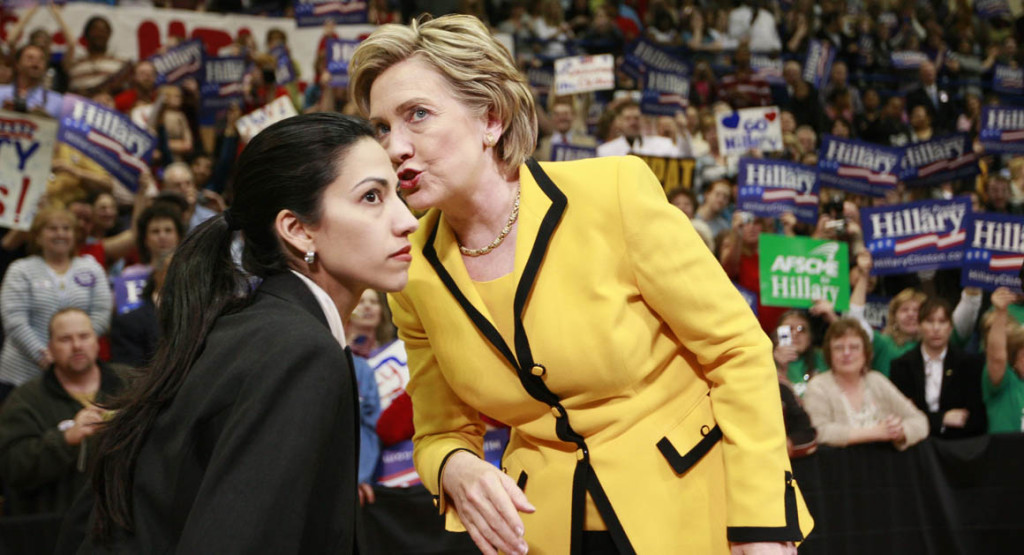
Hillary Rodham Clinton and her aides at the State Department were acutely aware of the need to protect sensitive information when discussing international affairs over email and other forms of unsecure electronic communication, according to the latest batch of messages released by the agency from Clinton’s tenure as secretary of state. The State Department made public roughly 7,121 pages of Clinton’s emails late Monday night, including 125 emails that were censored prior to their release because they contain information now deemed classified. The vast majority concerned mundane matters of daily life at any workplace: phone messages, relays of schedules and forwards of news articles. But in a few of the emails, Clinton and her aides noted the constraints of discussing sensitive subjects when working outside of the government’s secure messaging systems – and the need to protect such information. Senior adviser Alec Ross, in a February 2010 email intended for Clinton, cited frustration with “the boundaries of unclassified email” in a message about an unspecified country, which Ross referred to as “the country we discussed.” The email appears to focus on civil unrest in Iran during the period preceding the Green Movement, when Iranian protesters used social media and the Internet to unsuccessfully challenge the re-election of then-President Mahmoud Ahmadinejad. In an exchange from Feb. 6, 2010, Clinton asks aide Huma Abedin for talking points for a call she’s about to have with the newly appointed foreign minister of Ecuador. “You are congratulating him on becoming foreign minister, and purpose is to establish a personal relationship with him,” Abedin replied. “Trying to get u call sheet, its classified….” In another email from January 2010, Clinton aide Cheryl Mills responds angrily to a New York Times story based on leaked classified cables sent by Karl Eikenberry, the U.S. ambassador to Afghanistan. “The leaking of classified material is a breach not only of trust, it is also a breach of the law,” Mills wrote. Clinton also expressed frustration with the State Department’s treatment of certain ordinary documents as classified. After an aide noted the draft of innocuous remarks about the Israeli-Palestinian conflict was on the State Department’s classified messaging system, she responded, “It’s a public statement! Just email it.” Sent a moment later, the statement merely said that U.S. and British officials would work together to promote peace. “Well that is certainly worthy of being top secret,” Clinton responded sarcastically. All those email conversations with Clinton took place via her private email account, highlighting the challenge the front-runner for the Democratic presidential nomination faces as she struggles to explain her decision to set up a private email server at her New York home. She now says her decision to use a personal email account to conduct government business was a mistake. Government employees are instructed not to paraphrase or repeat in any form any classified material via unsecured email, which includes both the official state.gov email system and the account Clinton ran on her private server. State Department spokesman Mark Toner said Monday none of the information censored in Monday’s release was identified as classified when the emails were sent or received by Clinton, noting the redactions were made subsequently and only prior to the release of the emails under the Freedom of Information Act. In total, the State Department has now released 13,269 pages of Clinton’s emails, more than 25 percent of the total that she turned over from her private server, Toner said. Clinton provided the department some 30,000 emails she categorized as work-related late last year, while deleting a similar amount from her server because she said they were solely personal in nature. Clinton’s use of a private email may have created logistical problems communicating with State Department aides. “Well its clearly a state vs outside email issue,” wrote Abedin in August 2010, after another aide reported missing some messages from Clinton. “State has been trying to figure it out. So lj is getting all your emazils cause she’s on her personal account too.” Despite approving the creation of a relatively complex email system in her home, Clinton seemed puzzled by basic technology. In a July 2010 exchange, Clinton quizzed former staffer Philippe Reines on how to charge the Apple tablet and update an application. Reines asks Clinton if she has a wireless Internet connection, and she replies: “I don’t know if I have wi-fi. How do I find out?” A few of the messages released Monday hint at the ways Clinton’s family was involved in her work at the agency. Following the devastating Haiti earthquake in January 2010, Clinton wrote about her efforts to involve Bill Clinton in the disaster response. After an unnamed party assumed that former President Clinton’s preexisting role as a United Nations envoy to Haiti would sideline him from the reconstruction effort, Hillary stepped in. “I just spent an extra hour explaining the architecture” of the relief organizations, Clinton wrote. “Will fill wjc in on the plane.” Bill Clinton, who is often referred to by his initials “WJC,” ended up as co-chairman of the Interim Haiti Recovery Commission, a body with significant power over reconstruction funds. An email from Chelsea Clinton, addressed to “Dad, Mom,” offers a densely-written, seven-page assessment of conditions on the ground in Haiti based on her “data set and its clear limitations” after she took a four-day trip to the devastated island. “Please do not forward this in whole or in part attributed to me without asking me first,” she writes to her parents, saying she’s “happy to be an invisible soldier.” Republished with permission of the Associated Press.
Chris Christie tells Jimmy Fallon he might ‘go nuclear’ in next debate
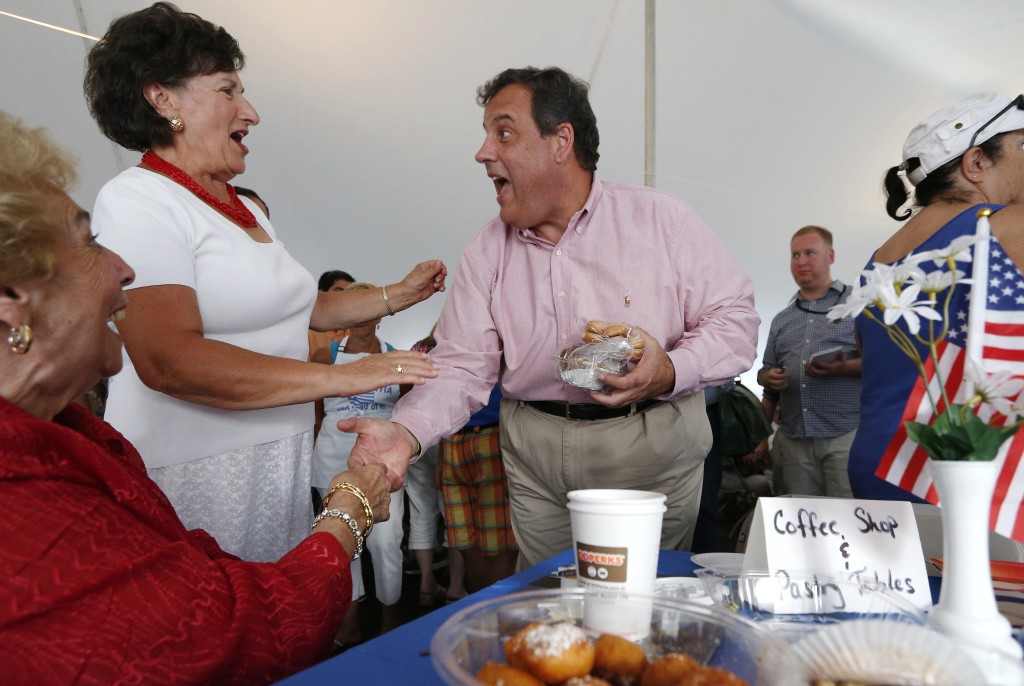
Chris Christie says he’s thinking of taking a more aggressive approach during the next Republican presidential primary debate. During an appearance on “The Tonight Show Starring Jimmy Fallon” Monday night, the New Jersey governor and presidential candidate told Fallon that he’s considering going “nuclear” if he’s relegated to the sidelines during the next GOP face-off, which will be moderated by CNN later this month. “Stay tuned on Sept. 16th,” Christie told Fallon, “We may be changing tactics. You know, if I get to like 15 questions in a row -— count ’em at home — if I get to 15 in a row (where he’s not called on), you’re going to go ‘Uh oh, he’s going to go nuclear now.’” Christie’s return to late-night TV comes as he’s been struggling to gain momentum in the crowded Republican field in the summer polls. During the interview, Fallon, who often jokes about Christie during his monologue, pressed the famously brash governor, suggesting that he’s been overshadowed by billionaire businessman and Republican front-runner Donald Trump. “Now Trump is running and boy is he just going out and he’s yelling and saying stuff. I thought that was going to be your thing,” Fallon said, adding that he’d expected Christie to be more aggressive during the first debate, jumping in shouting at people when questions weren’t directed at him. Christie had several notable clashes with his opponents during the Fox News debate and his performance was generally well-reviewed, but Trump nonetheless dominated coverage of the event. Fallon seemed pleased by Christie’s comments about switching things up at the next debate. “That’s what I’m talking about!” he said. “That’s what we want to see!” Christie also talked during the interview about a sleepover he had with rival Marco Rubio at 2012 GOP nominee Mitt Romney‘s home ahead of a Fourth of July parade in Wolfeboro, New Hampshire. After dinner the night before the parade, he said, Romney invited the two competitors, along with their families and a handful of his grandkids on a boat ride that included an unexpected stop for ice cream. They quickly realized that neither Christie nor Rubio had brought any cash and Romney only had $20 in his wallet. And then they heard a voice from behind. “‘Don’t worry, would-be presidents. I have it handled,’” said the voice. “And it was Ann Romney. She had the money.” There were also plenty of antics, with Christie repeatedly making fun of Fallon over several recent injuries and dramatically pretending to walk off set when Fallon made a fat joke at Christie’s expense. Republished with permission of the Associated Press.
Possible Joe Biden bid for White House faces rough road
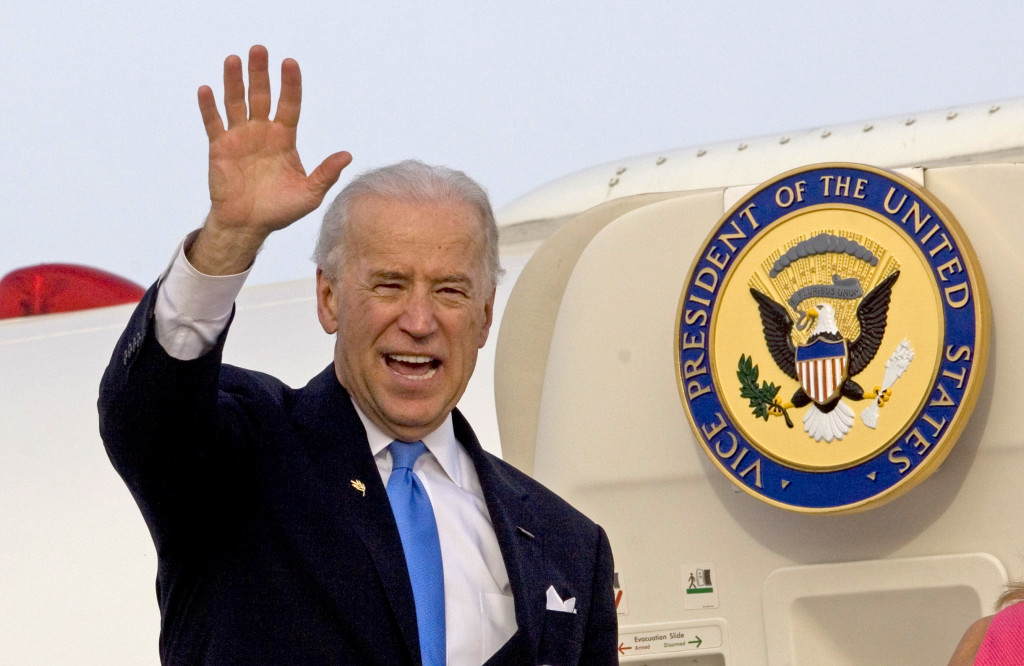
The only trace of the vice president came on a candy wrapper. Joe Biden may be considering whether to enter the race for president, but he sat out last week’s meeting of the Democratic National Committee. In his place, backers greeted a curious few in a hotel suite 20 floors above the official gathering, handing out chocolate bars wrapped with a stylized photo of Biden behind the wheel of a convertible and an “I’m Ridin’ with Biden” label. In any other year, a sitting vice president would have headlined such a meeting as the heavy favorite for the party’s nomination. Instead, the gathering served as proof that if Biden choses to run, he’ll do so as an underdog to Hillary Rodham Clinton. Clinton’s years-long flirtation with a second White House campaign — time her allies used to lock up support of much of the Democratic Party’s leadership — and her undeniable political celebrity have upended the traditional script. Rather than inheriting his party’s machine, a Biden campaign would have to find a way to take it back. “Secretary Clinton’s folks have been talking to these people for a very, very long time,” said Vermont Sen. Bernie Sanders, whose vibrant crowds and steady poll numbers make him Clinton’s strongest current challenger. “So she has a huge advantage.” Yet Biden’s supporters see an opening, due in no small part to Clinton’s inability to shake questions about her use of a personal email server while serving as secretary of state. His candor, long history of fighting for Democratic causes and personal struggles — a widower at a young age now grieving over the recent death of his son Beau — make him an admired figure in the party. “He’s one of us. He gets it,” said Jon Cooper, a supporter who this summer began working with a group encouraging Biden to enter the race. “Everybody likes Joe Biden.” That group, a super PAC named Draft Biden, is a blend of Chicago-based fans of the vice president and political operatives with ties to his family. It sent five employees to the DNC meeting, emailing attendees and passing out fliers in hallways to invite people to their pro-Biden hotel suite. A total of about 75 came to four open-house sessions, said Josh Alcorn, a former aide to Beau Biden who joined the group with the family’s blessing. “People seemed excited about the possibility and were willing to take a look,” he said. Some Democrats who heard the pitch asked to stay in touch. Others remained skeptical. “I asked them, ‘What’s his path?’” said Mitchell Ceasar, a Florida attorney and party operative. Their answer — that he could cobble together votes from all sorts of Democratic coalitions — prompted a shrug. “The challenge to the vice president is to present a compelling argument why someone should get on a different train, a different train that’s going in the same direction,” he said. The practicalities of running also remain difficult for the vice president. His supporters say he must decide before the first Democratic debate, in mid-October. While Biden has no campaign operation beyond the small Draft Biden group, Clinton has for months built a sprawling machine of hundreds of employees working out of her Brooklyn campaign headquarters and in dozens of offices across the country. Her version of Draft Biden, a since-shuttered outside group called Ready for Hillary, spent years before Clinton got into the race amassing millions of email addresses of potential supporters. Money is another challenge. Biden represented the small state of Delaware in the Senate and has never raised significant sums for his own campaigns. Draft Biden, just a few months old, raised less than $100,000 through the end of June. While supporters say bigger checks have been rolling in recently, Clinton is a former first lady and senator from New York with a strong fundraising history. In the first three months of her campaign, she raised $45 million for the primary contest alone. Clinton’s team has also devoted significant resources already to wooing super delegates — the party and elected officials empowered to select the presidential nominee at the Democratic national convention regardless of the 2016 primaries. Clinton backers, who sported gold “H” lapel pins at the DNC meetings, were rewarded for their loyalty with invitations to private briefings from Clinton and top campaign officials. Several hundred Democratic delegates who signed cards pledging to support her mingled atop a skyscraper in downtown Minneapolis Thursday night. Clinton talked for about 15 minutes, drawing cheers when she assured them, “I’m not a quitter.” Ed Cote, a Washington state Democratic leader and a Clinton admirer, said that event was a perfect example of why Biden would find himself in a tougher primary than a sitting vice president might expect. “Most of the people there have votes on the first ballots, and they’re solidly with her,” Cote said. “She’s doing exactly what she needs to be doing.” Clinton learned the importance of that support in 2008, when she ended her long, hard-fought primary campaign after it became clear she lacked enough delegates to capture the nomination. “We are working really hard to lock in as many supporters as possible,” Clinton said Friday. “This is really about how you put the numbers together to secure the nomination.” Republished with permission of The Associated Press.


